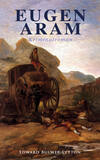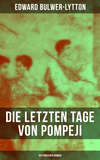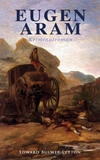Kitabı oku: «The Disowned — Complete», sayfa 12
CHAPTER XXV
Think upon my grief,
And on the justice of my flying hence,
To keep me from a most unholy match.
—SHAKSPEARE.
“But are you quite sure,” said General St. Leger, “are you quite sure that this girl still permits Mordaunt’s addresses?”
“Sure!” cried Miss Diana St. Leger, “sure, General! I saw it with my own eyes. They were standing together in the copse, when I, who had long had my suspicions, crept up, and saw them; and Mr. Mordaunt held her hand, and kissed it every moment. Shocking and indecorous!”
“I hate that man! as proud as Lucifer,” growled the General. “Shall we lock her up, or starve her?”
“No, General, something better than that.”
“What, my love? flog her?”
“She’s too old for that, brother; we’ll marry her.”
“Marry her!”
“Yes, to Mr. Glumford; you know that he has asked her several times.”
“But she cannot bear him.”
“We’ll make her bear him, General St. Leger.”
“But if she marries, I shall have nobody to nurse me when I have the gout.”
“Yes, brother: I know of a nice little girl, Martha Richardson, your second cousin’s youngest daughter; you know he has fourteen children, and you may have them all, one after another, if you like.”
“Very true, Diana; let the jade marry Mr. Glumford.”
“She shall,” said the sister; “and I’ll go about it this very moment: meantime I’ll take care that she does not see her lover any more.”
About three weeks after this conversation, Mordaunt, who had in vain endeavoured to see Isabel, who had not even heard from her, whose letters had been returned to him unopened, and who, consequently, was in despair, received the following note:—
This is the first time I have been able to write to you, at least to get my letter conveyed: it is a strange messenger that I have employed, but I happened formerly to make his acquaintance; and accidentally seeing him to-day, the extremity of the case induced me to give him a commission which I could trust to no one else. Algernon, are not the above sentences written with admirable calmness? are they not very explanatory, very consistent, very cool? and yet do you know that I firmly believe I am going mad? My brain turns round and round, and my hand burns so that I almost think that, like our old nurse’s stories of the fiend, it will scorch the paper as I write. And I see strange faces in my sleep and in my waking, all mocking at me, and they torture and aunt met and when I look at those faces I see no human relenting, no! though I weep and throw myself on my knees and implore them to save me. Algernon, my only hope is in you. You know that I have always hitherto refused to ruin you, and even now, though I implore you to deliver me, I will not be so selfish as—as—I know not what I write, but if I cannot be your wife—I will not be his! No! if they drag me to church, it shall be to my grave, not my bridal. ISABEL ST. LEGER.
When Mordaunt had read this letter, which, in spite of its incoherence, his fears readily explained, he rose hastily; his eyes rested upon a sober-looking man, clad in brown. The proud love no spectators to their emotions.
“Who are you, sir?” said Algernon, quickly.
“Morris Brown,” replied the stranger, coolly and civilly. “Brought that letter to you, sir; shall be very happy to serve you with anything else; just fitted out a young gentleman as ambassador, a nephew to Mrs. Minden,—very old friend of mine. Beautiful slabs you have here, sir, but they want a few knick-knacks; shall be most happy to supply you; got a lovely little ape, sir, stuffed by the late Lady Waddilove; it would look charming with this old-fashioned carving; give the room quite the air of a museum.”
“And so,” said Mordaunt, for whose ear the eloquence of Mr. Brown contained only one sentence, “and so you brought this note, and will take back my answer?”
“Yes, sir; anything to keep up family connections; I knew a Lady Morden very well,—very well indeed, sir,—a relation of yours, I presume, by the similarity of the name; made her very valuable presents; shall be most happy to do the same to you, when you are married, sir. You will refurnish the house, I suppose? Let me see; fine proportions to this room, sir; about thirty-six feet by twenty-eight; I’ll do the thing twenty per cent cheaper than the trade; and touching the lovely little—”
“Here,” interrupted Mordaunt, “you will take back this note, and be sure that Miss Isabel St. Leger has it as soon as possible; oblige me by accepting this trifle,—a trifle indeed compared with my gratitude, if this note reaches its destination safely.”
“I am sure,” said Mr. Brown, looking with surprise at the gift, which he held with no unwilling hand, “I am sure, sir, that you are very generous, and strongly remind me of your relation, Lady Morden; and if you would like the lovely little ape as a present—I mean really a present—you shall have it, Mr. Mordaunt.”
But Mr. Mordaunt had left the room, and the sober Morris, looking round, and cooling in his generosity, said to himself, “It is well he did not hear me, however; but I hope he will marry the nice young lady, for I love doing a kindness. This house must be refurnished; no lady will like these old-fashioned chairs.”
CHAPTER XXVI
Squire and fool are the same thing here
—FARQUHAR.
In such a night
Did Jessica steal from the wealthy Jew,
And, with an unthrift love, did run from Venice.
—-SHAKSPEARE.
The persecutions which Isabel had undergone had indeed preyed upon her reason as well as her health; and, in her brief intervals of respite from the rage of the uncle, the insults of the aunt, and, worse than all, the addresses of the intended bridegroom, her mind, shocked and unhinged, reverted with such intensity to the sufferings she endured as to give her musings the character of insanity. It was in one of these moments that she had written to Mordaunt; and had the contest continued much longer the reason of the unfortunate and persecuted girl would have totally deserted her.
She was a person of acute, and even poignant, sensibilities, and these the imperfect nature of her education had but little served to guide or to correct; but as her habits were pure and good, the impulses which spring from habit were also sinless and exalted, and, if they erred, “they leaned on virtue’s side,” and partook rather of a romantic and excessive generosity than of the weakness of womanhood or the selfishness of passion. All the misery and debasement of her equivocal and dependent situation had not been able to drive her into compliance with Mordaunt’s passionate and urgent prayers; and her heart was proof even to the eloquence of love, when that eloquence pointed towards the worldly injury and depreciation of her lover: but this new persecution was utterly unforeseen in its nature and intolerable from its cause. To marry another; to be torn forever from one in whom her whole heart was wrapped; to be forced not only to forego his love, but to feel that the very thought of him was a crime,—all this, backed by the vehement and galling insults of her relations, and the sullen and unmoved meanness of her intended bridegroom, who answered her candour and confession with a stubborn indifference and renewed overtures, made a load of evil which could neither be borne with resignation nor contemplated with patience.
She was sitting, after she had sent her letter, with her two relations, for they seldom trusted her out of their sight, when Mr. Glumford was announced. Now, Mr. George Glumford was a country gentleman of what might be termed a third-rate family in the county: he possessed about twelve hundred a year, to say nothing of the odd pounds, shillings, and pence, which, however, did not meet with such contempt in his memory or estimation; was of a race which could date as far back as Charles the Second; had been educated at a country school with sixty others, chiefly inferior to himself in rank; and had received the last finish at a very small hall at Oxford. In addition to these advantages, he had been indebted to nature for a person five feet eight inches high, and stout in proportion; for hair very short, very straight, and of a red hue, which even through powder cast out a yellow glow; for an obstinate dogged sort of nose, beginning in snub, and ending in bottle; for cold, small, gray eyes, a very small mouth, pinched up and avaricious; and very large, very freckled, yet rather white hands, the nails of which were punctiliously cut into a point every other day, with a pair of scissors which Mr. Glumford often boasted had been in his possession since his eighth year; namely, for about thirty-two legitimate revolutions of the sun.
He was one of those persons who are equally close and adventurous; who love the eclat of a little speculation, but take exceeding good care that it should be, in their own graceful phrase, “on the safe side of the hedge.” In pursuance of this characteristic of mind, he had resolved to fall in love with Miss Isabel St. Leger; for she being very dependent, he could boast to her of his disinterestedness, and hope that she would be economical through a principle of gratitude; and being the nearest relation to the opulent General St. Leger and his unmarried sister there seemed to be every rational probability of her inheriting the bulk of their fortunes. Upon these hints of prudence spake Mr. George Glumford.
Now, when Isabel, partly in her ingenuous frankness, partly from the passionate promptings of her despair, revealed to him her attachment to another, and her resolution never, with her own consent, to become his, it seemed to the slow but not uncalculating mind of Mr. Glumford not by any means desirable that he should forego his present intentions, but by all means desirable that he should make this reluctance of Isabel an excuse for sounding the intentions and increasing the posthumous liberality of the East Indian and his sister.
“The girl is of my nearest blood,” said the Major-General, “and if I don’t leave my fortune to her, who the devil should I leave it to, sir?” and so saying, the speaker, who was in a fell paroxysm of the gout, looked so fiercely at the hinting wooer that Mr. George Glumford, who was no Achilles, was somewhat frightened, and thought it expedient to hint no more.
“My brother,” said Miss Diana, “is so odd; but he is the most generous of men: besides, the girl has claims upon him.” Upon these speeches Mr. Glumford thought himself secure; and inly resolving to punish the fool for her sulkiness and bad taste as soon as he lawfully could, he continued his daily visits and told his sporting acquaintance that his time was coming.
Revenons a nos moutons. Forgive this preliminary detail, and let us return to Mr. Glumford himself, whom we left at the door, pulling and fumbling at the glove which covered his right hand, in order to present the naked palm to Miss Diana St. Leger. After this act was performed, he approached Isabel, and drawing his chair near to her, proceeded to converse with her as the Ogre did with Puss in Boots; namely, “as civilly as an Ogre could do.”
This penance had not proceeded far, before the door was again opened, and Mr. Morris Brown presented himself to the conclave.
“Your servant, General; your servant, Madam. I took the liberty of coming back again, Madam, because I forgot to show you some very fine silks, the most extraordinary bargain in the world,—quite presents; and I have a Sevres bowl here, a superb article, from the cabinet of the late Lady Waddilove.”
Now Mr. Brown was a very old acquaintance of Miss Diana St. Leger, for there is a certain class of old maids with whom our fair readers are no doubt acquainted, who join to a great love of expense a great love of bargains, and who never purchase at the regular place if they can find any irregular vendor. They are great friends of Jews and itinerants, hand-in-glove with smugglers, Ladies Bountiful to pedlers, are diligent readers of puffs and advertisements, and eternal haunters of sales and auctions. Of this class was Miss Diana a most prominent individual: judge, then, how acceptable to her was the acquaintance of Mr. Brown. That indefatigable merchant of miscellanies had, indeed, at a time when brokers were perhaps rather more rare and respectable than now, a numerous country acquaintance, and thrice a year he performed a sort of circuit to all his customers and connections; hence his visit to St. Leger House, and hence Isabel’s opportunity of conveying her epistle.
“Pray,” said Mr. Glumford, who had heard much of Mr. Brown’s “presents” from Miss Diana,—“pray don’t you furnish rooms, and things of that sort?”
“Certainly, sir, certainly, in the best manner possible.”
“Oh, very well; I shall want some rooms furnished soon,—a bedroom and a dressing-room, and things of that sort, you know. And so—perhaps you may have something in your box that will suit me, gloves or handkerchiefs or shirts or things of that sort.”
“Yes, sir, everything, I sell everything,” said Mr. Brown, opening his box. “I beg pardon, Miss Isabel, I have dropped my handkerchief by your chair; allow me to stoop,” and Mr. Brown, stooping under the table, managed to effect his purpose; unseen by the rest, a note was slipped into Isabel’s hand, and under pretence of stooping too, she managed to secure the treasure. Love need well be honest if, even when it is most true, it leads us into so much that is false!
Mr. Brown’s box was now unfolded before the eyes of the crafty Mr. Glumford, who, having selected three pair of gloves, offered the exact half of the sum demanded.
Mr. Brown lifted up his hands and eyes.
“You see,” said the imperturbable Glumford, “that if you let me have them for that, and they last me well, and don’t come unsewn, and stand cleaning, you’ll have my custom in furnishing the house, and rooms, and—things of that sort.”
Struck with the grandeur of this opening, Mr. Brown yielded, and the gloves were bought.
“The fool!” thought the noble George, laughing in his sleeve, “as if I should ever furnish the house from his box!” Strange that some men should be proud of being mean! The moment Isabel escaped to dress for dinner, she opened her lover’s note. It was as follows.—
Be in the room, your retreat, at nine this evening. Let the window be left unclosed. Precisely at that hour I will be with you. I shall have everything in readiness for your flight. Be sure, dearest Isabel, that nothing prevents your meeting me there, even if all your house follow or attend you. I will bear you from all. Oh, Isabel! in spite of the mystery and wretchedness of your letter, I feel too happy, too blest at the thought that our fates will be at length united, and that the union is at hand. Remember nine. A. M.
Love is a feeling which has so little to do with the world, a passion so little regulated by the known laws of our more steady and settled emotions, that the thoughts which it produces are always more or less connected with exaggeration and romance. To the secret spirit of enterprise which, however chilled by his pursuits and habits, still burned within Mordaunt’s breast, there was a wild pleasure in the thought of bearing off his mistress and his bride from the very home and hold of her false friends and real foes; while in the contradictions of the same passion, Isabel, so far from exulting at her approaching escape, trembled at her danger and blushed for her temerity; and the fear and the modesty of woman almost triumphed over her brief energy and fluctuating resolve.
CHAPTER XXVII
We haste,-the chosen and the lovely bringing;
Love still goes with her from her place of birth;
Deep, silent joy, within her soul is springing,
Though in her glance the light no more is mirth.
—Mrs. HEMANS.
“Damn it!” said the General.
“The vile creature!” cried Miss Diana.
“I don’t understand things of that sort,” ejaculated the bewildered Mr. Glumford.
“She has certainly gone,” said the valiant General.
“Certainly!” grunted Miss Diana.
“Gone!” echoed the bridegroom not to be.
And she was gone! Never did more loving and tender heart forsake all, and cling to a more loyal and generous nature. The skies were darkened with clouds,—
“And the dim stars rushed through them rare and fast;”
and the winds wailed with a loud and ominous voice; and the moon came forth, with a faint and sickly smile, from her chamber in the mist, and then shrank back, and was seen no more; but neither omen nor fear was upon Mordaunt’s breast, as it swelled beneath the dark locks of Isabel, which were pressed against it.
As Faith clings the more to the cross of life, while the wastes deepen around her steps, and the adders creep forth upon her path, so love clasps that which is its hope and comfort the closer, for the desert which encompasses and the dangers which harass its way.
They had fled to London, and Isabel had been placed with a very distant and very poor, though very high-born, relative of Algernon, till the necessary preliminaries could be passed and the final bond knit. Yet still the generous Isabel would have refused, despite the injury to her own fame, to have ratified a union which filled her with gloomy presentiments for Mordaunt’s fate; and still Mordaunt by little and little broke down her tender scruples and self-immolating resolves, and ceased not his eloquence and his suit till the day of his nuptials was set and come.
The morning was bright and clear; the autumn was drawing towards its close, and seemed willing to leave its last remembrance tinged with the warmth and softness of its parent summer, rather than with the stern gloom and severity of its chilling successor.
And they stood beside the altar, and their vows were exchanged. A slight tremor came over Algernon’s frame, a slight shade darkened his countenance; for even in that bridal hour an icy and thrilling foreboding curdled to his heart; it passed,—the ceremony was over, and Mordaunt bore his blushing and weeping bride from the church. His carriage was in attendance; for, not knowing how long the home of his ancestors might be his, he was impatient to return to it. The old Countess d’Arcy, Mordaunt’s relation, with whom Isabel had been staying, called them back to bless them; for, even through the coldness of old age, she was touched by the singularity of their love and affected by their nobleness of heart. She laid her wan and shrivelled hand upon each, as she bade them farewell, and each shrank back involuntarily, for the cold and light touch seemed like the fingers of the dead.
Fearful, indeed, is the vicinity of death and life,—the bridal chamber and the charnel. That night the old woman died. It appeared as if Fate had set its seal upon the union it had so long forbidden, and had woven a dark thread even in the marriage-bond. At least, it tore from two hearts, over which the cloud and the blast lay couched in a “grim repose,” the last shelter, which, however frail and distant, seemed left to them upon the inhospitable earth.
CHAPTER XXVIII
Live while ye may, yet happy pair; enjoy
Short pleasures, for long woes are to succeed.
—MILTON.
The autumn and the winter passed away; Mordaunt’s relation continued implacable. Algernon grieved for this, independent of worldly circumstances; for, though he had seldom seen that relation, yet he loved him for former kindness—rather promised, to be sure, than yet shown—with the natural warmth of an affection which has but few objects. However, the old gentleman (a very short, very fat person; very short and very fat people, when they are surly, are the devil and all; for the humours of their mind, like those of their body, have something corrupt and unpurgeable in them) wrote him one bluff, contemptuous letter, in a witty strain,—for he was a bit of a humourist,—disowned his connection, and very shortly afterwards died, and left all his fortune to the very Mr. Vavasour who was at law with Mordaunt, and for whom he had always openly expressed the strongest personal dislike: spite to one relation is a marvellous tie to another. Meanwhile the lawsuit went on less slowly than lawsuits usually do, and the final decision was very speedily to be given.
We said the autumn and the winter were gone; and it was in one of those latter days in March, when, like a hoyden girl subsiding into dawning womanhood, the rude weather mellows into a softer and tenderer month, that, by the side of a stream, overshadowed by many a brake and tree, sat two persons.
“I know not, dearest Algernon,” said one, who was a female, “if this is not almost the sweetest month in the year, because it is the month of Hope.”
“Ay, Isabel; and they did it wrong who called it harsh, and dedicated it to Mars. I exult even in the fresh winds which hardier frames than mine shrink from, and I love feeling their wild breath fan my cheek as I ride against it. I remember,” continued Algernon, musingly, “that on this very day three years ago, I was travelling through Germany, alone and on horseback, and I paused, not far from Ens, on the banks of the Danube; the waters of the river were disturbed and fierce, and the winds came loud and angry against my face, dashing the spray of the waves upon me, and filling my spirit with a buoyant and glad delight; and at that time I had been indulging old dreams of poetry, and had laid my philosophy aside; and, in the inspiration of the moment, I lifted up my hand towards the quarter whence the winds came, and questioned them audibly of their birthplace and their bourne; and, as the enthusiasm increased, I compared them to our human life, which a moment is, and then is not; and, proceeding from folly to folly, I asked them, as if they were the interpreters of heaven, for a type and sign of my future lot.”
“And what said they?” inquired Isabel, smiling, yet smiling timidly.
“They answered not,” replied Mordaunt; “but a voice within me seemed to say, ‘Look above!’ and I raised my eyes,—but I did not see thee, love,—so the Book of Fate lied.”
“Nay, Algernon, what did you see?” asked Isabel, more earnestly than the question deserved.
“I saw a thin cloud, alone amidst many dense and dark ones scattered around; and as I gazed it seemed to take the likeness of a funeral procession—coffin, bearers, priests, all—as clear in the cloud as I have seen them on the earth: and I shuddered as I saw; but the winds blew the vapour onwards, and it mingled with the broader masses of cloud; and then, Isabel, the sun shone forth for a moment, and I mistook, love, when I said you were not there, for that sun was you; but suddenly the winds ceased, and the rain came on fast and heavy: so my romance cooled, and my fever slacked; I thought on the inn at Ens, and the blessings of a wood fire, which is lighted in a moment, and I spurred on my horse accordingly.”
“It is very strange,” said Isabel.
“What, love?” whispered Algernon, kissing her cheek.
“Nothing, dearest, nothing.”
At that instant, the deer, which lay waving their lordly antlers to and fro beneath the avenue which sloped upward from the stream to the house, rose hurriedly and in confusion, and stood gazing, with watchful eyes, upon a man advancing towards the pair.
It was one of the servants with a letter. Isabel saw a faint change (which none else could have seen) in Mordaunt’s countenance, as he recognized the writing and broke the seal. When he had read the letter, his eyes fell upon the ground, and then, with a slight start, he lifted them up, and gazed long and eagerly around. Wistfully did he drink, as it were, into his heart the beautiful and expanded scene which lay stretched on either side; the noble avenue which his forefathers had planted as a shelter to their sons, and which now in its majestic growth and its waving boughs seemed to say, “Lo! ye are repaid!” and the never silent and silver stream, by which his boyhood had sat for hours, lulled by its music, and inhaling the fragrance of the reed and wild flower that decoyed the bee to its glossy banks; and the deer, to whose melancholy belling be had listened so often in the gray twilight with a rapt and dreaming ear; and the green fern waving on the gentle hill, from whose shade his young feet had startled the hare and the infant fawn; and far and faintly gleaming through the thick trees, which clasped it as with a girdle, the old Hall, so associated with vague hopes and musing dreams, and the dim legends of gone time, and the lofty prejudices of ancestral pride,—all seemed to sink within him, as he gazed, like the last looks of departing friends; and when Isabel, who had not dared to break a silence which partook so strongly of gloom, at length laid her hand upon his arm, and lifted her dark, deep, tender eyes to his, he said, as he drew her towards him, and a faint and sickly smile played upon his lips,—
“It is past, Isabel: henceforth we have no wealth but in each other. The cause has been decided—and—and—we are beggars!”










